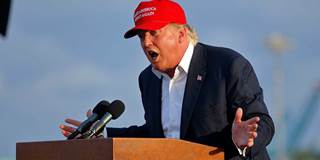High-level Republicans who are refusing to support Donald Trump often declare that he lacks the "temperament" to be US president. And they are right: Trump lacks a key dimension of emotional intelligence, which is critical to successful leadership.
CAMBRIDGE – Last month, 50 former national security officials who had served at high levels in Republican administrations from Richard Nixon to George W. Bush published a letter saying they would not vote for their party’s presidential nominee, Donald Trump. In their words, “a President must be disciplined, control emotions, and act only after reflection and careful deliberation.” Simply put, “Trump lacks the temperament to be President.”
In the terminology of modern leadership theory, Trump is deficient in emotional intelligence – the self-mastery, discipline, and empathic capacity that allows leaders to channel their personal passions and attract others. Contrary to the view that feelings interfere with thinking, emotional intelligence – which includes two major components, mastery of the self and outreach to others – suggests that the ability to understand and regulate emotions can make overall thinking more effective.
While the concept is modern, the idea is not new. Practical people have long understood its importance in leadership. In the 1930s, former Supreme Court Justice Oliver Wendell Holmes, a crusty old veteran of the American Civil War, was taken to meet Franklin D. Roosevelt, a fellow Harvard graduate but one who had not been a distinguished student. Asked later about his impressions of the new president, Holmes famously quipped: “second-class intellect; first-class temperament.” Most historians would agree that Roosevelt’s success as a leader rested more on his emotional than his analytical IQ.

CAMBRIDGE – Last month, 50 former national security officials who had served at high levels in Republican administrations from Richard Nixon to George W. Bush published a letter saying they would not vote for their party’s presidential nominee, Donald Trump. In their words, “a President must be disciplined, control emotions, and act only after reflection and careful deliberation.” Simply put, “Trump lacks the temperament to be President.”
In the terminology of modern leadership theory, Trump is deficient in emotional intelligence – the self-mastery, discipline, and empathic capacity that allows leaders to channel their personal passions and attract others. Contrary to the view that feelings interfere with thinking, emotional intelligence – which includes two major components, mastery of the self and outreach to others – suggests that the ability to understand and regulate emotions can make overall thinking more effective.
While the concept is modern, the idea is not new. Practical people have long understood its importance in leadership. In the 1930s, former Supreme Court Justice Oliver Wendell Holmes, a crusty old veteran of the American Civil War, was taken to meet Franklin D. Roosevelt, a fellow Harvard graduate but one who had not been a distinguished student. Asked later about his impressions of the new president, Holmes famously quipped: “second-class intellect; first-class temperament.” Most historians would agree that Roosevelt’s success as a leader rested more on his emotional than his analytical IQ.